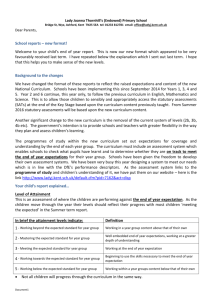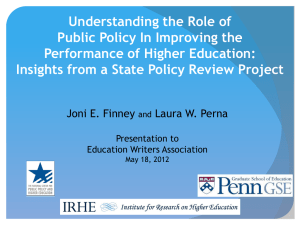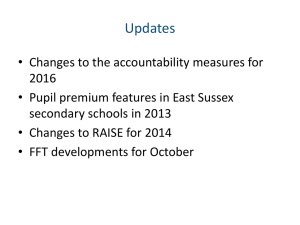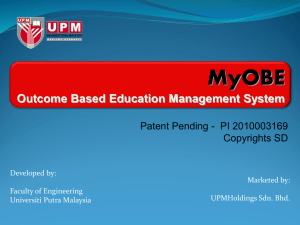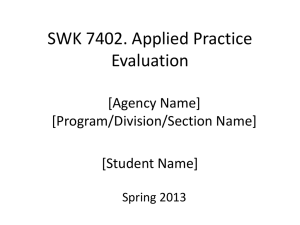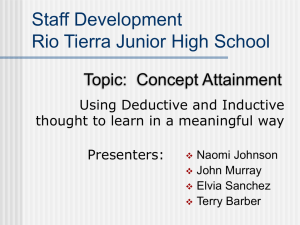Curriculum and Assessment changes Oct 2014
advertisement
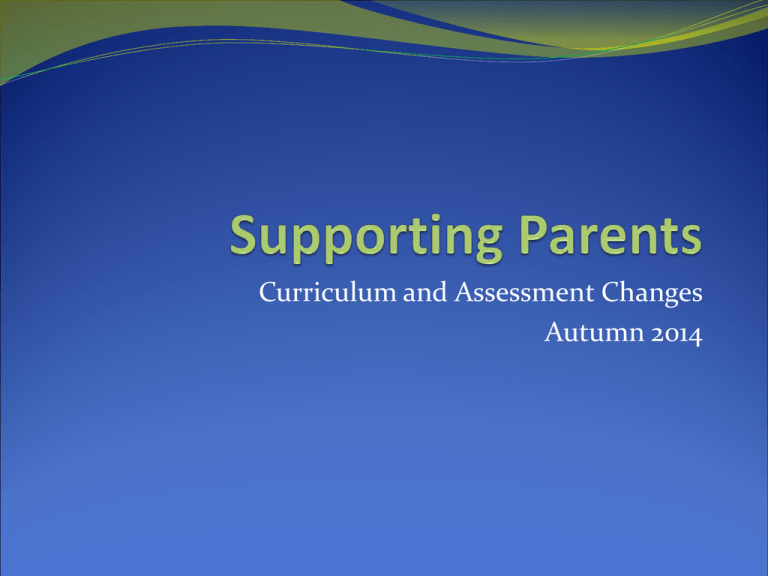
Curriculum and Assessment Changes Autumn 2014 Curriculum changes • September 2014, New National Curriculum to be implemented in primary schools. [ a slight phasing over 2 years] • The National Curriculum is statutory BUT it is not the total offer. • Need to be proactive to decide what is the SCHOOL curriculum. • Need to decide the curriculum that is right for our pupils in our context. Curriculum Changes ‘ The sum total of all learning and experiences that influence development and progress.’ The National Curriculum is only part of the Primary Curriculum The ‘Spaldwick Curriculum’ will be developed to meet the needs of all our learners. National Curriculum Curriculum Changes Key themes linked to implementation of the new National Curriculum • The combination of strong leadership and high quality teaching is critical to success. • Schools need to articulate and embed high expectations. • Schools should have the freedom to develop more innovative & effective approaches to learning. • Government want to embed a sense of ambition and love of learning for its own sake. • Schools need to be ambitious for all children; regardless of background. • The curriculum should maintain both breadth and balance. • Each school should develop its own curriculum to achieve the above aspirations. Curriculum Changes • Maintained schools must follow the statutory National Curriculum and teach the subjects specified at the appropriate key stages. • There are detailed programmes to be followed in English, mathematics and science. • Specific content within subjects has changed as national expectations of attainment have been raised. • The proposed English programmes of study will embody higher standards of literacy. Pupils will be expected to develop a stronger command of the written and spoken word. Through the strengthening of the teaching of phonics pupils will be helped to read fluently. • All schools must teach religious education at all key stages • In other subjects and key stages we are aiming to give teachers more space and flexibility to design their lessons by focusing only on the essential knowledge to be taught in each subject. • The study of languages to be compulsory in Key Stage 2 • Replace the current ICT curriculum with a new computing curriculum with a much greater emphasis on computational thinking and practical programming skills Curriculum Changes It is essential to distinguish between the statutory National Curriculum and the whole school curriculum. All schools must provide a curriculum that is broadly based, balanced and meets the needs of all pupils At Spaldwick • We have put together an academic year curriculum • • • • overview for each class. Within this curriculum overview we have planned for the teaching and learning of both the national curriculum and the Spaldwick curriculum. The curriculum is planned using a range of timeframes. The school values are an important element of our curriculum. The curriculum will continue to be monitored and reviewed as we move through the academic year. Spaldwick Curriculum Examples National Curriculum Year curriculum summary Spaldwick Curriculum Outcomes, our starting list Our topic curriculum overview Autumn One Topic example Changes to Attainment and Assessment • The current system of levels & level descriptors will be removed and not replaced. ‘We agreed that levels have become too abstract, do not give parents meaningful information about how their child is performing, nor give pupils information about how to improve.’ (DFE) • Schools will be responsible for developing their own approaches to formative assessment. • The DFE will provide examples of ‘good practice’. Changes to Attainment and Assessment Measurement of attainment, and progress, in LEVELS has disappeared, EXCEPT for current Year 6 pupils. Year 6 pupil attainment will be measured and reported in Levels [ eg 3a, 4b, 5c] Measurement of attainment in LEVELS has disappeared, EXCEPT for statutory assessment measurement to be provided on current year 2 pupils [ eg End of Key Stage One assessments, as Levels] Attainment and progress for Foundation Stage Pupils will continue to be made against the Foundation Stage Profile Measurement of attainment, and progress in other year groups will be reported using progress towards new national expectations at THREE milestone stages Changes to Attainment and Assessment • Milestone One, national expectation of achievement at END of YEAR TWO • Milestone Two, national expectation of achievement at END of YEAR FOUR • Milestone Three, national expectation of achievement at END of YEAR SIX • There are NO set measurements or nationally agreed steps within the journey to the milestone At Spaldwick We DO have a very rigorous and detailed attainment and assessment system in place throughout the school. We have reviewed this system in relation to the attainment milestones. We are developing detailed milestone progression steps to support your child’s progress. At the moment we are developing a ‘five step’ journey to ensure the confident achievement of the milestone content of skills, knowledge and understanding. At Spaldwick This is a time of NEW LANGUAGE. Moving away from Levels to Milestones. Moving away from ‘a,b c’ to ‘beginning, approaching, working within, working at and secure’ This is a time of development.
